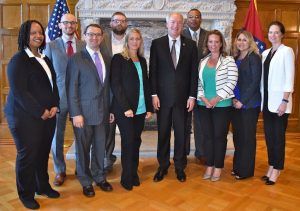Under 40 Forum group delivers ideas on healing Arkansas ‘fractures’ to Gov. Hutchinson
by May 30, 2017 6:00 pm 1,335 views

An “aggressive and uncommon” approach to education, efforts toward boosting “cultural competency” and the need to push a rural state toward “demands of the modern economy” are some of the many recommendations in the 2017 Under 40 Forum report delivered Tuesday (May 30) to Gov. Asa Hutchinson.
The report was compiled and produced by the Winthrop Rockefeller Institute, the Clinton School of Public Service, Arkansas Business and the Northwest Arkansas Business Journal. The report is being mailed to political, business and community leaders across the state. (Link here for a PDF download of the report. A short video about the report is at the end of this report.)
The report summarizes the discussions that took place March 2-3 at the Rockefeller Institute at the Under 40 Forum, which invited all 40 Under 40 honorees as designated by the two business publications in 2016 to engage in meaningful dialogue to address “Fractured Arkansas.” The topic sought to explore the various divisions – social, economic, cultural, political, etc. – that divide the state and hinder progress, and to offer solutions to those challenges. The forum was supported this year by Electric Cooperatives of Arkansas, Simmons Bank, the Arkansas State Chamber of Commerce and the Clinton School.
During the early March forum, former Arkansas Gov. Mike Beebe (D) challenged the group of business leaders from Central and Northwest Arkansas to “accept the responsibility of leadership” if they want to be part of healing geographic and political divisions in Arkansas and the country. He also placed much of the blame for the “growing rancor” on decades of Congressional redistricting in the states to protect a Democrat or Republican. He said the gerrymandering has resulted in sending extremists to Washington instead of people willing or able to work in the “soft mushy middle” of the political spectrum in which compromise and progress happens that help people instead of political parties
A group of the 2017 Under 40 Forum participants met Tuesday with Gov. Asa Hutchinson to discuss the report and expand on their findings.
“After my meeting with the Under 40 honorees at the Capitol on Tuesday morning, I am more confident than ever about the future of Arkansas,” Hutchinson said. “This generation of leaders have big ideas and the commitment to service that will help bring the ideas into reality. I applaud them for their hard work and clear thinking.”
One of the key issues identified in the report is a need for alternative approaches to education.

“It’s no surprise that education was a key part of the discussion at the Under 40 Forum,” said Dr. Marta Loyd, executive director of the Rockefeller Institute. “This topic was a highlight of their meeting with the governor. They championed a greater commitment to internships and mentorships for high school students. Building bridges between the business community and our schools was a clear priority.”
The group included a regional focus in their discussion on education.
“They noted that shifting demographics, technology and additional focus on education issues by disparate advocacy groups has provided innumerable paths to prosperity. Some regions, often the ones with more resources, seem to flourish,” the report noted in the section on education. “The vast amount of programs that are in operation across the state coupled with the extraordinary amount of information presented to people daily makes it difficult to keep up with what is working best. Add to that, what works best in Mena may not be what works best in Magnolia.”
Another key theme of the report is leadership in cultural competency.
“The need for better understanding across cultural gaps is pretty clear,” said Skip Rutherford, dean of the Clinton School of Public Service. “It was encouraging to have this impressive group of young leaders, from various cultural backgrounds, all working together and all willing to be honest with the governor about what they think is important.”
One of the recommendations in the report is for cultural competency to become a priority not just in the more populated portions of the state, but also in small towns and in corporate board rooms.
Following are a few of the other report findings.
• “Struggling areas must mindfully address their population shrinkage by rightsizing. Size does not necessarily equal wealth, despite the perception to the contrary. This means an enhanced focus on walkable neighborhoods and commercial districts as well as a sharper focus on entrepreneurship.”
• “In order for students to be successful in an evolving economy and for communities to remain competitive, there must be an offering of nontraditional curriculum for all students. This nontraditional curriculum should range from the state’s history of entrepreneurship and advanced robotics to storytelling for additional trade as well as apprenticeship opportunities for credit and beyond.”
• “In order to address lack of access to opportunity and stimulate upward social mobility, Under 40 Leaders recommend at first undertaking a targeted approach, focusing on high school students. This outreach would provide information regarding the opportunities to aid social mobility via a list or database of opportunities that exist within both the community and the county/region.”
• “One of the areas where Under 40 Leaders felt Arkansas is mired in the past comes from purposefully divisive legislative efforts. This does not reflect the majority of Arkansans, the Under 40 Leaders believe. Self-in- flicted wounds are difficult to heal. ‘Reputations [of states] change fast,’ one Under 40 Leader said. ‘Just look at North Carolina.’”
https://youtu.be/cH2b4sMVdpU
